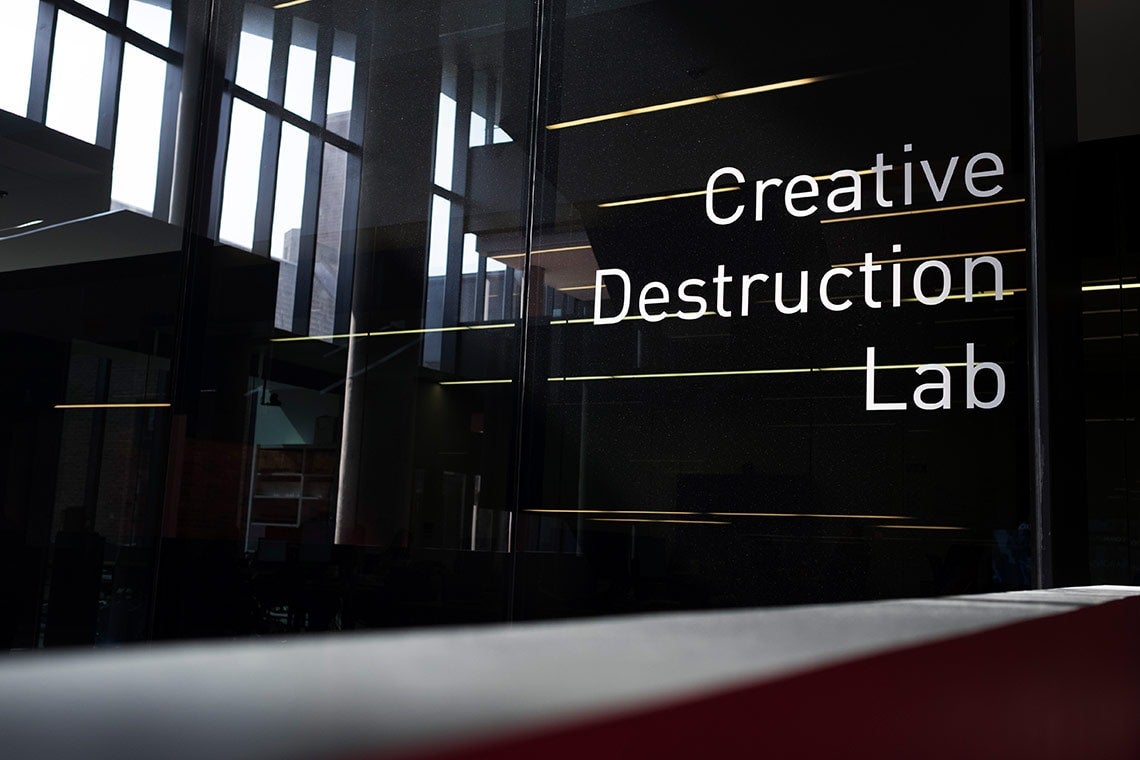U. Toronto Invests in Rotman Innovation, Data, and Entrepreneurship

Innovation, entrepreneurship, data, and analytics all play significant roles at the University of Toronto’s Rotman School of Management. As a global center for research and academic excellence in business and society, Rotman is known for bringing together diverse views and initiatives. So, it should be no surprise that this month the Rotman School announced increased investment, from different sources, in three areas:
- $25 million in funding for the Creative Destructive Lab (CDL)
- $4 million in new funding for data and analytics initiatives
- $2.5 million to the Creative Destructive Lab Health Stream and additional financial resources in support of the Behavioral Economics in Action at Rotman (BEAR) research center.
Creative Destruction Lab Receives $25 Million

Founded in 2012, the Creative Destruction Lab (CDL) was created to address failure in the market for judgment. As a seed stage program, its goal is to help science-based companies become scalable by pairing founders with experienced entrepreneurs and investors. The nine-month program covers everything from commercialization of products to R&D and maximizing equity-value creation.
To increase the CDLs ability to help young companies, the Canadian government announced a $25 million investment in the program. The investment will allow the CDL to accelerate the commercialization of science in Canada while hopefully also attracting more investment in ventures and more intellectual property. Over four years, the CDL will help more than 1,300 science-based ventures and could create up to 22,000 new jobs.
In a recent press release, Minister Bains says:
“Creative Destruction Lab’s exciting project promises to unleash a new wave of start-up innovation across Canada, creating thousands of middle-class jobs and further securing Canada’s position as a world leader in the AI field. Our government is proud to make investments that will help turn hundreds of innovative ideas into the good jobs and companies of tomorrow.”
The investment will also help the CDL gain insight into the success of science-based startups. In particular, ventures harness new technologies such as AI, energy, health, smart cities, and space and quantum technologies will be targeted. There will also be a boost for young women in science, technology, engineering, and math (STEM) fields in the hopes of inspiring representation in the next generation of business leaders.
“This is a tremendous moment,” Tiff Macklem, Dean at the Rotman School, says. “Thank you Minister Bains, the Government of Canada and everyone that saw the vision and opportunity of the Creative Destruction Lab.”
The investment was made through the Strategic Innovation Fund; a program focused on attracting and supporting high-quality business investments across all sectors of the economy.
$4 Million for Data and Analytics

Data and analytics are an essential area of study at the Rotman School as evidenced by the launch of the new Master of Management Analytics (MMA) program as well as the TD Management Data and Analytics Lab. So, it makes sense that when the TD Bank Group (TD) was looking for a way to support the Rotman School, they decided to give $4 million in funding to explore real-world data and analytics applications.
Christian Nelissen, TD Senior Vice President of Enterprise Data and Analytics, says in a news release:
“Data and analytics are the engines powering the future of Canada’s economy. That new reality means building talented teams that have a deep understanding of the potential of data and analytics, in financial services and beyond. We are looking for visionaries who can see what’s possible—things we might not even have thought of yet.”
Specifically, the funding will go toward development and staffing of the TD Management Data and Analytics Lab, which launched in 2017. The goal of the investment is to improve student development and engagement in data and analytics, and to add expertise and resources for industry projects and cutting-edge analytic thinking. The Lab also offers workshops, hackathons, guest speakers, academic collaboration, and seed funding for the Rotman FinHub.
“By collaborating with TD, we are giving students the opportunity to engage in data-focused problem-solving,” Dean Macklem says. “We know our students are eager to take on new roles in the evolving field of data and analytics and this generous investment will allow us to move more quickly to further expand our data analytics programming and opportunities.”
Investing in Healthcare Innovation & Behavior Economics

Last, but certainly not least, TD Bank Group announced additional investments in two initiatives: innovation in healthcare and behavioral economics.
The first investment from TD is $2.5 million over five years for the Creative Destruction Lab Health Stream, which focuses on biotechnology, bioinformatics, diagnostics, and digital care. This investment will help aspiring entrepreneurs bring technological innovations to the market in the healthcare industry.
Andrea Barrack, TD’s Vice President of Global Corporate Citizenship, says:
“We know that the long-term success of our business depends upon the resilience and health of the people we serve. We’re thrilled to support the CDL with this contribution, which will help accelerate advances in healthcare through fresh thinking and entrepreneurship. At TD, we have a history and meaningful purpose of helping to enrich the lives of customers, colleagues and communities.”
The second investment from TD comes in the form of an agreement to bring additional behavioral finance resources and applications in support of the Behavioral Economics in Action at Rotman (BEAR) research center. As a founding member of BEAR, TD hopes to be able to better examine and research the underlying emotion and behaviors that push financial decision making. Also, the investment will help continue to implement behavioral finance tools into wealth management.
“Being one of the founding members of BEAR will further contribute to TD’s commitment to advancing the study and real-life applications of behavioral finance,” says Dave Kelly, Senior Vice President of TD Wealth. “The work we have done to-date with Rotman has been instrumental in enhancing the advice and services our advisors provide to our clients. Research by BEAR will enable us to better understand the underlying factors that help drive financial decision making so we can connect with our clients on a deeper, more meaningful level.”
The End of Non-Compete Clauses, and More – Toronto News

Representatives from some of Toronto’s strongest business schools have made many contributions to help better their communities this week. Check out some best stories from the week.
Restaurant Brands International to Review ‘No-Poach’ Franchise Agreements – Vancouver Courier
Restaurant Brands International, one of the largest global quick service restaurant companies, indicated that it may be re-thinking the ‘no-poach’ clause in employee contracts. ‘No-poach’ clauses (also known as non-compete clauses) prevent employees from one franchise location from moving to different competing franchise location within the same chain. Experts, including Maurice Mazerolle, Associate Professor at Ryerson University’s Ted Rogers School of Management, believe the clause prevents wage growth for people working in this field.

Restaurant Brands International, which operates Canadian-mega chain Tim Horton’s, may be ditching its “no-poach” clause for its employees.
“In theory, in a tight labour market it basically means you’re not going to be able to bid up wages to compete for those experience workers,” Mazerolle said in an interview with the Vancouver Courier.
Restaurant Brands International owns Canada staple Tim Hortons, as well as Burger King and Popeyes Louisiana Kitchen, with franchises in the U.S. and Canada. Representatives from the fast-food giant have said that they will be consulting their franchisee advisory boards to discuss changing the ‘no-poach’ clause in employee contracts.
You can read more about ‘no-poach’ franchise agreements here.
Medicine by Design and Creative Destruction Lab Partner to Accelerate the Commercialization of World-Class Research in Regenerative Medicine – Medicine by Design
Creative Destruction Lab (CDL), a seed-stage program for science and tech companies that was launched University of Toronto’s Rotman School of Management in 2012, has partnered with Medicine by Design to support the monetization of and nationwide access to regenerative medicine. CDL Executive Director Sonia Sennik said:
“The Creative Destruction Lab has a strong history of supporting health-based companies, and we are very excited to deepen this area of focus through our Health Stream. By partnering with Medicine by Design, we can expand a successful model to include companies on the cutting edge of cell therapy and regenerative medicine.”
Medicine by Design’s regenerative medicine initiative perfectly complements the CDL’s commitment to providing resources for health innovators. The CDL has locations in Vancouver, Calgary, Montreal, Halifax, and New York City.
Read more about the partnership here.
Recycling Provides Manufacturers With Economic Advantages, Study Say – Indiana University
Gal Raz, associate professor at Western University Canada’s Ivey Business School, and Gilvan C. Souza, professor at Indiana University’s Kelley School of Business, co-authored a study that appeared in Production and Operations Management. In the study, “Recycling As A Strategic Supply Source,” the researchers investigated how recycling could provide lucrative resources for companies in today’s changing supply market. The researchers found that recycling can prove to be a wise fiscal decision for companies in the metal cutting tool and inserts industry.
“Because you become your own supplier—you sell your products and you collect them and you recycle them—it gives you your own source of raw materials,” Souza said. The professors’ research showed that recycling can protect companies from changes in the market. According to Souza, recycling “insulates you from the volatility of the market, at least partially. You’re still buying some portion of your raw materials from the commodity market, which is volatile, but if that’s a smaller and smaller portion, then that’s a significant benefit.”
Read more about the recycling study here.
